#parallels my gender journey actually now that i think of it
Text
Yknow the more I think about and explore my identity, the more nonhuman my labels get.
For a long time i just kinda really liked animals. I pretended to be something or other at recess and such, and I distinctly remember a few times where i got kinda serious about it too. But not like "yo hold up i'm literally a critter", just enjoyed it. (except for the time i tried to do those "spells" to turn me into a werewolf and even tried p-shifting. we don't talk about that.)
And then I found out 'therian' was a thing, thought about it for a bit and went "heyyyy wait a sec. that me? that might be me"
i've been in the community since, though how much focus i put on it waxed and waned. It took me maybe like... 7 years to figure out what i was. Throughout that time, i honestly never got attached to '-kin' or really strongly attached to any one label - which tbf was basically just "therian" and "otherkin" because I knew I wasn't human, i just didn't quite fit either definition.
Cut to today, after i began hanging out in broader alterhuman spaces and also just became more comfortable in really expressing myself in general. At some point it dawned on me that i could just call myself nonhuman. And that... fits so well.
And it fits so well that i've stopped considering myself human at all. "Human" fits me like "girl" does - worked for a long time, but doesn't apply now that i know myself better.
I've rambled a lot already so i'm gonna keep going and you can't stop me. I've never had 'shifts', i'm always the same level of critter. There's no separation between human and fox, there is just... fox. Sometimes my form more closely matches my humanoid shell, but my thoughts and feelings are always the same.
I guess this is my incredibly lengthy way of saying i'm just not human. At all. I still have a bit of unpacking to do before I'm ready to fully call myself a holothere or physical nonhuman, but yeah.
#just me doing a think ig#parallels my gender journey actually now that i think of it#though thankfully with much less panic and much more 'huh that's neat'#kaz yips#kaz rambles#nonhuman#kitsune nonhuman
8 notes
·
View notes
Text
Like can we think about the journey this website has taken? From mocking people who claim not to be bigoted and smugly patting them on the head and explaining that they are bigots but just don't realize it... to becoming those bigots?
This website used to laugh at people who said "I'm not a homophobe! I'm not afraid of things that are the same lel!" Now it says "We're not antisemites... we have nothing against Semites only genocidal Zionazis and their colonizer supporters 😂"
This website used to see red when people said "I'm not a transphobe, I just have concerns about the unregulated influence this MOVEMENT OF GENDER IDEOLOGUES is having on innocent children!" Now it says "We're not antisemites, we're just curious who is funding all this pro-Zionist legislation and initiatives and campus organizations! Aren't you worried that Zionists have an undue influence in our government and culture?"
This website used to sneer at people who said "I'm not a racist! It's a fact that black people [misquoted and misinterpreted statistic]! My God you people are against the truth!" Now it says "We're not antisemites when Zionists have proven that their bloodthirsty fascistic goals are widely supported by Jewish institutions in America, who aren't even true Jews by the way! Zionism =/= Judaism real Jews support Palestine ✊"
This website used to roll its eyes at people who said "I'm not a misogynist! Women have their equal rights under the law, and if you research it they actually have it better off than men in several areas, they're always whining about nothing!" Now it says "We're not antisemites, Jews are a protected class, more than you can say for most actual minorities, they control succeed in finance, entertainment, politics, in what ways are they oppressed? Where are these streets that Jews don't feel safe on lol? Why do they always cry antisemitism when there's a genocide going on? They actually collaborate with the police state btw 🤓"
And there are so many more examples and parallels and my posts are always too long. Antisemitism is the rug being pulled out from under Leftists to reveal that they've been right wing bigots this whole time. Antisemitism is a tool that Leftists use to radicalize themselves into abandoning their own principles, because it's just too enticing not to use it.
291 notes
·
View notes
Note
Are you comfortable with questions about your journey to HRT?
Like, mentally how you took the leap of faith from femboy to needing something more / different. Asking for, uh, *a friend*, yeah 👀
Holy shit, this got long. This springboarded me into a massive writing about how my life influenced my personal gender philosophy, and is probably more than you bargained for. But I hope it's helpful in some way! I actually had a similar conversation recently with an NB, not on HRT friend of mine. What's the jump that makes you want to do HRT?
I don't think my experience parallels that of a lot of people's - everyone's is unique. But I do think there are good takeaways from my thoughts on this. Now that I have an Adderall prescription and my quarter is about to end, I've started writing some kind of more cited and developed essay or video essay, but that's random future stuff. This post itself is gonna be a little rambling, and a little personal. Sorry!
Vaguely, I think that the *push* to start HRT was a distinct force from tearing down the internal barriers associated with HRT, if that makes any sense. For many people, I think they have some sense of a mild preference of the gender they would "want" to be, but it doesn't bother them enough to actually break down the barriers to transition. For me, breaking those barriers, both internal and external, was as important as the motivations to transition themselves.
One of the major barriers in people's heads, often without them realizing it, is some kind of inherent belief in the "sanctity" of their body. For many people, "permanent changes" are terrifying, "unnatural", and even if they don't have medical risks, intrinsically *feel* like a medical risk they're taking on some level. It's an offshoot of purity culture in a weird way- it's the same root as a fear of psychiatric medicine making you "not you". Much of this is intrinsically religious, but a lot is actually not. I had a little bit of this growing up. Being raised atheist certainly helped in this regard, even though it was still a queerphobic slavic atheism.
The tiny bit of this I did have was sanctity of my mind, which internally, I still viewed as a separate entity from my body. This was 100% incited by crushing academic pressure, which influenced how I think and my own morality in a lot of unexpected ways. I grew up in a kind of infamously high pressure education area. It sounds unrelated, but it's really not. My mind, academics, and thinking kind of got put on a pedestal on my mind. My personal image of myself was basically a detached orb of thoughts and public speaking. I had 0 connection to my body. But since my mind was everything, both psychiatric medication and HRT were these vile things that could alter how I think and my mood! Gasp!
The final, crushing blow to both of these mentalities was studying biology. And WOW there's so much I could say about how studying biology has influenced how I think about this idea, which I want to talk about a lot more outside of the scope of just a tumblr post. But to summarize- it's not even about finding a biological "reason" for transness. It's about how I saw a living thing as a detailed, dynamic, intricate, constantly changing system that is as much a function of its environment as it is any intrinsic factors. And this includes the mind. So since I'm a shambling mass of chemicals anyways..... Why not be a shambling mass of slightly different chemicals?
The "detached orb" image isn't entirely accurate, though. Because, from an early age, I did have a self image that made me happy. And it was a female one. I shoved this deeply out of my mind in shame, leaving behind the "orb". This was my "push", as I called it before. In addition to a weird separation between my mind and my body, an additional factor contributed to my detachment- a growing distress around developing male traits during puberty, which coincided in the worst ways with academic pressure during teen and preteen years. Looking back, I now recognize this as dysphoria. I don't think my dysphoria was ever as extreme as many other people. But this is why I'm emphasizing taking down barriers as much as the weight of dysphoria itself. It has always been easy to distract from my dysphoria, but it's always been my "resting state" without realizing it.
Linked a bit to the second point is also how I felt shame about exploring any aspect of my life other than academic and professional achievement. Being raised in a high pressure environment means that any exploration of my queer identity felt like a distraction from the "real" things I should be focusing on. The final thing that tore this down, which I don't recommend for ANYONE, was an almost traumatic set of events during the pandemic/my masters degree that made me have a wake up call. I wasn't structuring anything in my life for my own happiness. Going through that made me realize I was going to continue being miserable unless I changed that. So... I started taking the idea of transitioning to actually work on my happiness very seriously.
Being a femboy was actually how I tried to reconcile these things in my head. It was my attempt to "compartmentalize"- allow myself to gently indulge in gender nonconformity and the happiness associated with it, while still not making the "commitment" to fully transition. It helps that most of my existence as a femboy was crossdressing during the height of the pandemic- spending hours on analysis and writing while living alone during my MS, wearing femme outfits while I did it. And of course, taking pics to kick off this whole online persona. I also kind of liked the idea of cis gender nonconformity as a concept, and still do. I love how femboys fuck with gender, and I wanted a slice of that for myself. It wasn't enough long term, and my new commitment to happiness overcame my desire to compartmentalize.
The final barriers were practical. By the end of my masters in 2022, I knew I wanted to transition, I just needed to get my social and financial shit together. Cue moving to my PhD university, becoming active in the queer community here, having an accepting professional environment... and yeah. Here I am. Still gotta socially transition outside of my queer circles, but now, I even have a plan for that. I still got a long way to go, but for the first time, I feel like I'm going in the right direction. And I'm very, very happy.
A lot of this is not applicable to everyone. It's mostly my personal experience. But if there is one thing that I think should apply to everyone here, it's this: kill bioessentialism in your mind. Kill the concept of complete sanctity of your mind and body. Break the barriers and then let yourself move freely across the new landscape you've opened up. At the very least, you'll come out with a more healthy relationship with your cis identity. And at best, you'll find a new part of you that needed to be found.
The other thing I think is broadly applicable is this: when initially figuring things out, stop thinking about what you "are", and start thinking about what you want. Would it make you happy to grow breasts, curves, have a femme face, estrogen regulated emotions, and other transfemme HRT changes? Because those are the actual, physical effects of HRT. If the answer is yes, start it. There's no reason not to. Your identity can come later. You deserve to be happy *for the explicit purpose of being happy*. You don't need to validate that desire through some other random factor.
This got WAAAYYYY too long, but if you have any questions, please, please ask!!!!
#im gonna use trans femboy nb and a binch of other random tags bc of how this deals with the interface of all of them#im not equating them or calling trans people crossdressers to be clear#trans#transgender#queer#genderqueer#nonbinary#transfemme#transmasc#femboy#transitioning#trans journal#trans journey#lgbt#hrt#transition#trans pride#cross dressing#mtf trans#trans fem
134 notes
·
View notes
Note
Do you think that Arya becoming the Lady of Winterfell is a possible endgame for her? Or if not, what leadership role could she possibly hold?
I have always stood by my theory that Arya Stark will be Lady of Winterfell/Wardeness of the North and follow in her father's footsteps as the Stark in Winterfell.
She will be the first female head of Winterfell/North as is only appropriate considering her arc is about challenging patriarchal constraints and she wants more than what is offered to her. She will parallel Nymeria (The direwolf names being a metaphorical representation of the Starks and their journeys) in working towards having more female power in the North. Already Alys Karstark will have more power in House Karstark, the Mormonts have always been that way and she will certainly have the support of the likes of Wylla Manderly from house Manderly.
More importantly, if Jon has his way and the Freefolk are integrated into the North, there will be all the Spearwives and leaders in their own right like Val and Morna White Mask. I can see someone like Val for example respecting Arya Stark compared to her contempt for someone like Selyse Baratheon. We see hints of the Night's Watch already changing:
The castle Jon returned to was far different from the one he'd left that morning. For as long as he had known it, Castle Black had been a place of silence and shadows, where a meagre company of men in black moved like ghosts amongst the ruins of a fortress that had once housed ten times their numbers. All that had changed. Lights now shone through windows where Jon Snow had never seen lights shine before. Strange voices echoed down the yards, and free folk were coming and going along icy paths that had only known the black boots of crows for years. Outside the old Flint Barracks, he came across a dozen men pelting one another with snow. Playing, Jon thought in astonishment, grown men playing like children, throwing snowballs the way Bran and Arya once did, and Robb and me before them. - Jon, ADwD
[Side note: This is also why I believe Jon will be KITN for a while. Others have written/explained this better than me that to enact change, our young leaders need to actually wield power. Dany can only help the slaves because she has power, same with Jon as Lord Commander. Someone like Jon could settle them on the Gift and give them the choice to worship or live as they please as long as they follow the laws of the place]
The North itself is depleted, a lot of fighting men are dead and Winter has come. After the Long Night is the time to implement reform and change and it only makes sense that the character whose story challenges issues of gender, class, war etc. will be a leader of some kind in the North, involved in rebuilding the new North. And I am sure, Arya will have Jon Snow's support to be leader of the North.
Or she will be supporting whichever brother - Bran or Rickon - as Lord of Winterfell, marry her blacksmith and settle down on some land offered by her brother. Or she will leave with Jon and live in the Lands beyond the Wall. Or, or maybe she AND Jon will marry and lead the North together. So many options, so few books 😂. We really need the next book to get an inclination of which way GRRM is headed.
29 notes
·
View notes
Text
🔮Twisted Wonderland Theory Guess 🔮
“🤔 Is MC/Yuu is descendants of ‘Balance Keeper’? Or Alice from series ‘Alice Comedies’?”
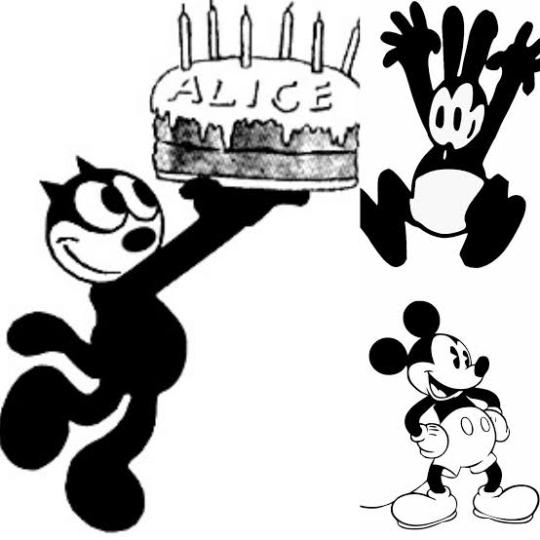
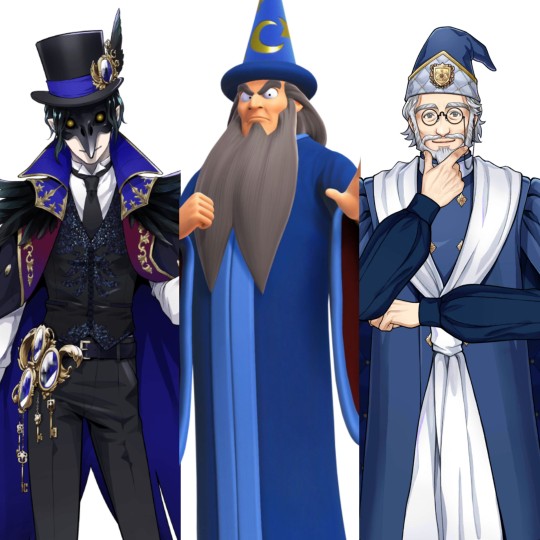
Never thought we are going to follow MC/Yuu's journey to Episode 07 Diasomnia soon. Probably the main story will began on winter seasons. Suddenly I want to discuss about the MC/Yuu, along other Yuu from Twst comic and Twst novel. We already know a two main character that resemble as MC/Yuu (Not official yet),Enma Yuuken (Comic) and Kuroki Yuuya(Novel). Since it's school of boys, means the MC is a male, while in the game the MC gender is neutral. Can be male or female. Same like other games too.
Even MC/Yuu doesn't have a magic skills in Twisted Wonderland, MC has a unknown ability that can read predict what will happen on those students. Sort of a dimension psychic mind to see subject past and presence. Also, MC is the first person who met Mickey Mouse in the mirror. Dire Crowley did gave MC "Ghost Camera" in Prologue, a camera that is able to take a picture of anything possessing a soul. Sounds very similar how we make a moving pictures to make a animation short film in 90s. In scene old Disney "Alice in Wonderland" at “Alice Comedies”.
I did realize something of MC's ability "Time sight" of Future, Past, and presence. It is similar ability of Master Yen Sid, The Balance Keeper. Yen Sid is also can see someone's past like MC's did see Villains Past in different parallel. It could possibly MC is Yen Sid's Descendants. Why you ask? MC and Yen Sid almost similar, they're not in Heroes or Villains side. More like Tritagonist or Rebel. A person who knows which path they must follow and will seek the truth in knowledge. Plus, remember when the magic dark mirror in Prologue Can't see the colors of MC's souls due ceremony NRC? That is why MC is resemble of "Balance", between light and dark like Yen Sid. So, MC souls color is grey. Even the students see MC more like Cheeky and Blunt. No matter MC doesn't have a magic, but MC did have a secret talent That no one can have. Now let's talk about Connection MC with Grim. Grim's name is from story fairy tale. We maybe think Grim is similar with Stitch, but actually he remind me of Julius the Cat from "Alice Comedies". His mischievous, helper, and comedic is similar with Julius.
Only thing something connection to this, MC resemble as Alice and Grim as Julius. Alice met Julius the Cat in Cartoon land when Alice done visit Mr."WD" in his animation workshop. Julius always accompany Alice wherever she goes to seek new adventure she never see before. Same how Grim will always accompany MC to seek if there's a chance to return to real world while help Grim to graduate in Night Raven College with others too.
I do believe that Dire Crowley and Ambrose could it be Yen Sid "Apprentice". Both of them had same level mastery magician, Ambrose with Light Magic and Crowley with Dark Magic. While Yen Sin both light and magic, Balance Magic. I got feeling that Ambrose approach to Dire Crowley more like his "Kouhei/Junior", while Ambrose is Crowley "Senpai/Senior" (if it's true). One thing I suspicious on Crowley is, Crowley could be doing this Overblot situation is following the original Villains role story by choosing students that is already Have Villains heritage magic. Like Riddle, Leona, Azul, Jamil, Vil, Idia and Malleus when everyone is in Coffin due ceremony Dark Mirror. Grim could be part Crowley's plan too or it just Crowley himself pretend he didn't know anything. Ambrose actually knows what's going Due VDC last year in Episode 05 Pomefiore. Which means Ambrose can predict future like Merlin. For Crowley, he could be resemble "The Phantom Blot", character from "House of Mouse" and monster in "Epic Mickey". Since who else knows about "Blot" thing?
Last is connection with Mickey Mouse, we know that Mickey as iconic mascot of Disney. Funny of my thoughts that Ambrose and Crowley remind me of Mickey and Oswald the Lucky rabbit. While Grim as Julius the Cat. In Epic Mickey, Oswald feel jealous and annoying that his "father"-Loves Mickey the most, same goes to Toon people who always remember him than Oswald. Same goes Crowley is sick that people more support to RSA and Ambrose than NRC and himself.
101 notes
·
View notes
Text
I sadly missed posting on trans visibility day. I didn't forget, but I had a test and then I hung out with a friend. We celebrated our last test.
Thought it was time to share a bit of my gender journey, and my plans for the future.
I'm making progress telling people. Three people from university known I'm genderfluid.
One is a student a year ahead of me. She was paired with me by the accessibility department to help me stay put together in my studying. They actually saw on my calendar trans visibility day. After saying she needs to remember to wish their trans friend a happy trans visibility day (nicely indicating she is a safe person) they asked what my pronouns were. I then came out to her.
I won't go into the other stories now.
A few weeks ago I also told my uncle who also was very supportive.
A new semester is starting soon, and I'm thinking of just shifting into: "I use he/they pronouns" official, during classes and with other students. I'm kinda scared, but it's a relatively good place to practice.
Parallel to that, I want to come out to my close family. My parents and siblings. And once I do that other changes may be more practical to do. Such as wearing my binder more often. This is really scary though and I'm just not sure.
5 notes
·
View notes
Text
ds9 season 4 episode 13 “crossfire”
O'BRIEN: I don't see why Captain Sisko insists on having me here. I'm not a senior officer.
BASHIR: Maybe he just wanted to see you in your dress uniform. It does show off your figure.
O'BRIEN: Why, thank you.
I-
what am I supposed to say to this
seriously though this episode was so, so angsty and Odo is pining for Kira and he’s so upset
also? somehow it simultaneously feels like a “first love/crush” kinda story and a queer allegory
I don’t think I have to explain the first, it’s pretty obvious (the pining, the devastation when Kira and Shakaar get together, the trying to get over it by avoiding her)
now, the second: what screamed “this is a queer experience” to me was how Odo doesn’t want to admit to his feelings for Kira because he thinks he shouldn’t have these feelings, that they’re wrong, that’s he’s wrong for having them. at first he tries not acknowledging them because maybe it’ll go away but then Quark confronts him and idk if this was intentional, (or if I’m finding things where there isn’t anything) but it seemed to me that his anger at Quark is also because of anger at himself and fear that someone knows and fear of what this means for him
now, obviously this isn’t universal, but many of those feelings - “wrongness,” denial, fear, confusion, anger - are things that I, and I’m guessing many others, went through on our “wait wait wait I’m not actually [fill in the blank]” journey
besides that, there’s Kira starting a relationship with Shakaar. Shakaar, who in one very important way, is the opposite of Odo: he’s a humanoid. Odo, while appearing like one, is most definitely not. this, I think, parallels having feelings for someone you know (or, think you do) cannot feel the same way about you (easiest example being liking a straight person of your own gender)
(also side ramble- Odo’s a shapeshifter, a changeling, a gelatinous liquid, why does he have a gender???)
also, just earlier in this episode, Odo and Worf were bonding over how they both like order and Odo mentioned how everything in his quarters has its own specific spot and nothing is allowed to be out of place (and last episode or maybe a couple episodes ago Odo was mad at Jadzia for breaking in and moving everything around by just a few centimeters) and then. he goes. and he smashes up his quarters, completely destroying any order, and then just sits quietly in the rubble and it’s so sad
and of course, Quark comes in, and Odo doesn’t even turn around to look at him, doesn’t tell him to get out, barely says anything until “funny, for a moment there I thought you were speaking to me as a friend”
and then we just. see a closeup of Odo’s face, looking almost vulnerable, for a good few seconds, and Quark tries to play it down by saying “nah” and leaving but I for one don’t think it worked that well
also another side note - in this scene Odo has some stray hairs. however, he doesn’t actually have hair, he just shapeshifts to create the appearance of hair, which means that he purposely crated stray hairs because he was that distraught
which brings me back to my original point about smashing up his quarters: he goes against his instinct for order and brings chaos, both to his quarters and to his hair, because he’s feeling chaotic, and conflicted, and disorderly
and to see that, from Odo, it’s… heartbreaking, in a way (but to me it feels more like heartbreaking in the way that watching a kid become disillusioned about the world would be)
anyways. it’s very sad but Quark’s pep talk seems to help, he picks himself up and orders his quarters soundproofed so Quark can stop complaining. And, this decision is iffy but also understandable, he also tries to cut his friendship with Kira by cancelling their weekly meetings, which. um. as I said, is iffy. I think in the future he’d just regret losing such a close friendship and it might not even help? but on the other hand if it hurts him that much to be around her, maybe the avoidance will give him time and space to sort himself out and move on? (for some reason, I wanna know what Quark would say about it, he’s been the only one giving Odo any sort of advice this episode anyways)
anyways. I think that’s it, just wow this episode inspired a lot of feelings in me that I didn’t even notice until I started typing
#ds9#s4e13#crossfire#odo#don’t mind me rambling into the void#hey tumblr suggests that as a tag for me now yay
4 notes
·
View notes
Text
Wew got high and finally was able to imagine/conceptualize what it would have been like if I had felt free to trans my gender from the start. Like if when the genders suddenly started to segregate socially at a young age, being nonbinary was a thing and it was widely understood how gender varies like a spectrum, and transition is very much a thing both possible and good. I think I would have been nb/gf for a bit, dabble briefly with testosterone before ultimately settling on estrogen and a womanly identity. Or at least a path of some similar shape. Basically paralleling my actual journey just quicker and better. Like faster actualizing. And actually endiing up with not too dissimilar an identity from how I am now. Damn was that cathartic
0 notes
Text
"You want to know what death is? I'll tell you. Death is the loss of life. Despite everything doctors like me attempt... a patient's life can still fall through our fingers. You think death lies in the apex of science? Anyone with such little regard for life will die by my hand."
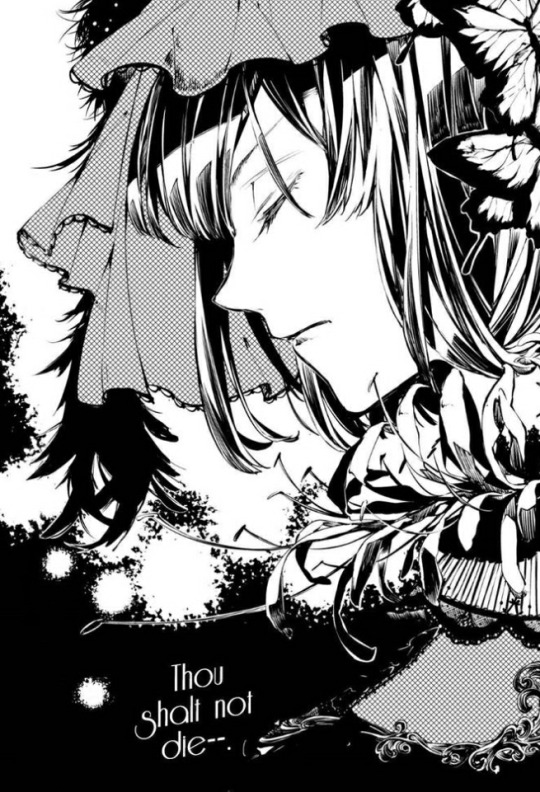
Character Analysis: Yosano Akiko
Age: 25 || Ability: Thou Shalt Not Die
BSD CHAPTER CHAPTER 65-66 SPOILERS
table of contents:
1. Author counterpart.
2. Yosano's history.
3. 'Angel of Death' defined.
4. Yosano and Atsushi.
YOSANO BRAINROT!*(#&!*@#($
1. Author counterpart.
Having been given the “Sho Ho” at birth, Yosano Akiko’s counterpart—the real-life author—was known for her zealous take on both feminism and pacifism.
Side note: Once again, to avoid confusion, I will use the name Sho Ho in reference to the real-life author, and Yosano in reference to the BSD character.
Sho Ho's writings were pretty much out-of-the-ordinary in her time, and despite being suppressed by the social norms of gender hierarchy, she sought to reform society’s view on the cultural perspectives of women and their sexuality (She expressed her love for a woman in one of her poems, but many still argued on whether she identified herself as queer or not.)
"Thou Shalt Not Die," Yosano's ability, is actually named after one of Sho Ho's most famous, controversial poems. She wrote it for her brother, who was a soldier in the war between Russia and Japan (1904-1905). In her poem, she expressed her general distaste for war and how her brother was a part of it.
O my young brother, I cry for you
Don't you understand you must not die!
You who were born the last of all
Command a special store of parents' love
Would parents place a blade in children's hands
Teaching them to murder other men
Teaching them to kill and then to die?
Have you so learned and grown to twenty-four?
- excerpt from Sho Ho's poem, "Kimi Shinitamou Koto Nakare"
Her words were blunt enough to inflict guilt on her brother's conscience, as she wasn't afraid to express her disapproval over how her brother took part in the typical violent bloodshed and manslaughter of war. Such opinions perturbed the authorities, and her work was eventually banned from the public for a period of time. Later on, it was used as an anti-war statement.
2. Yosano's history.
Now, as for the character in BSD, Yosano is seen to be generally strong-willed, and later on, we see that she is terrifyingly compassionately ambitious in the way she treats her patients. She treasured life itself, and hated the thought of losing a patient.
Yosano had developed her relations with Mori Ougai back in the Great War, when she was just 11 years old. Her ability was a great benefactor in saving lives. Realistically speaking, she was used for her ability to heal injured soldiers and diminish the effect of any casualty acquired.
Initially, she wasn't aware of this, until one of her close friends pointed it out by subtly accusing Mori of manipulating her to participate in the War under the close-to false pretence of 'saving lives.'
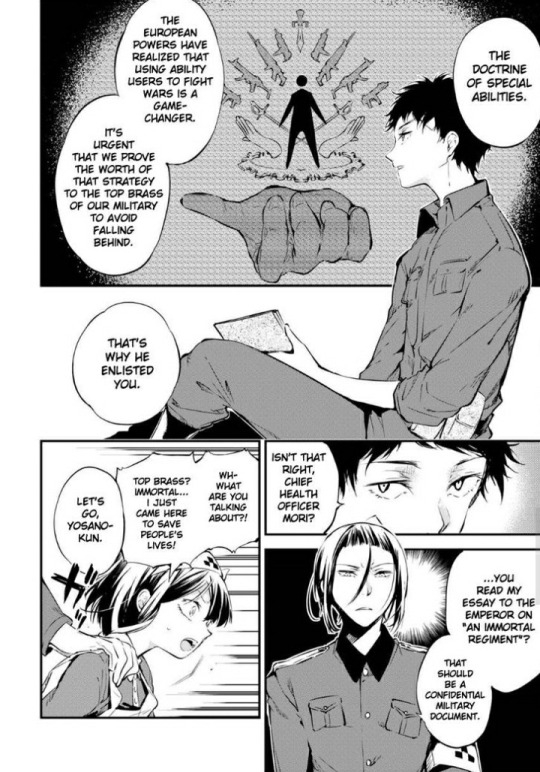
As much as her ability did save lives, it also forced soldiers to return to the frontlines and suffer injuries over and over again. The soldiers were never given the opportunity to return to their families because of her ability. This obliged them to carry on in the war without any excuse, inserting them into a vicious cycle they had no escape out of.
Metaphorically speaking, Yosano's hatred for Mori sort of mirrors Sho Ho's disdain for war and fighting, don't you think? The way Kafka materialised Yosano's past was quite interesting because he used chapters 65 and 66 to explain Yosano's dislike for Mori, reflecting how Sho Ho used her poem to explain why she condemned the idea of war and how her brother was part of it.
Before the effect of her ability was fully understood, however, every soldier praised and thanked her for what an angel she was. One of the soldiers she had befriended and gotten close to even kept a tally of the number of times she had saved him. He was the one who gifted her the butterfly hairpin she wore all the time.
The weight of the truth that her ability was a curse rather than a blessing fully dawned on her when her soldier friend ultimately committed suicide, because the fact of being indefinitely trapped in the throes of war agonised him until his spirit gave out. This drove Yosano to loathe her ability, or rather, how it was used.
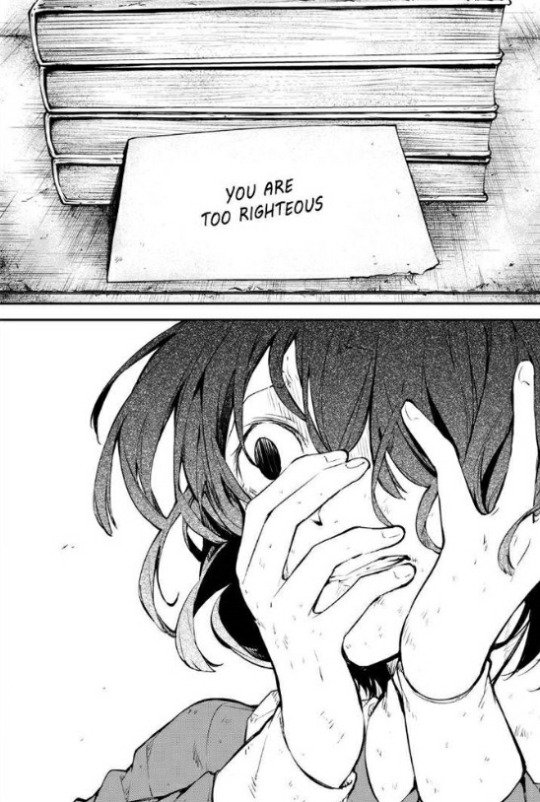
In the time she participated in the War, Yosano was given the alias 'angel of death' due to the control she retained over the battlefield, but I thought that perhaps Kafka had a reason behind giving her this title, so I did my research.
3. 'Angel of Death' defined.
Side note: I wouldn't want to disrespect any culture or religion, so if my citations are inaccurate and/or disrespectful, do feel free to correct me/let me know! I did research out of pure curiosity, and I don't intend to twist the significance of any of the interpretations.
I had to grow up learning about the basics of religious stuff, so it's kind of nice to study something out of the box, and very much against my father's rigid belief system :D
ARCHANGEL ARIEL
(archangel: an angel of higher rank)
I came across the few characteristics of angels/goddesses and their roles, and the one which really caught my attention was the female archangel, Ariel, the angel of nature.
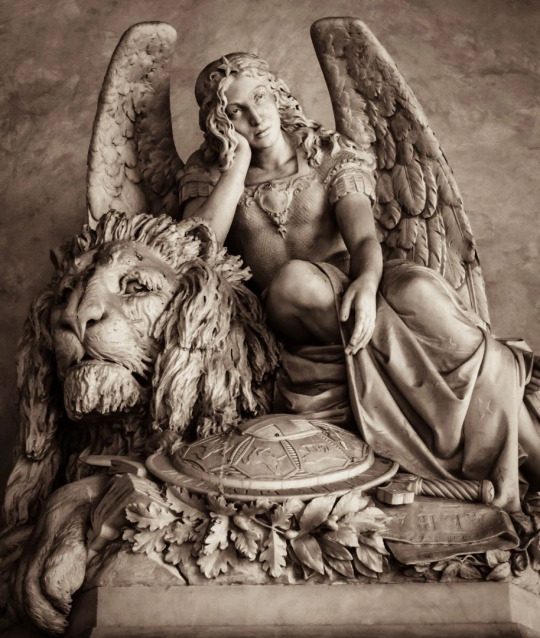
[ source ]
In Hebrew, the name Ariel means 'altar' or 'lioness of God,' and her role is to heal. In addition to that, she is also recognised as a helper to another one of the seven main archangels, Raphael, whose role is to provide physical and emotional healing, too.
She is the protecter of the environment and the animals therein, and is bestowed with the duty to oversee the order of heavenly bodies as well as earth's natural resources. She assures the sustenance of food, water, shelter, and supplies of human beings, much like how a nurse is to a patient I suppose.
In relation to Yosano, I think this part is pretty self-explanatory, or perhaps this is blown out of proportion HA, so take this as a suggestion rather than a fact, because I'd like to believe that Kafka had a reason for giving Yosano a title as such.
In the past, I've come across the angel of death only to perceive it as a female grim reaper of some sort, so it was pretty cool to find that the word 'angel' and 'death' made up a title of a someone like Ariel, one of the purest forms of humility and compassion.
GREEK GODDESS PANAKEIA
For my beloved (wannabe/or not) students of Greek mythology (much like myself, let's make a cult!), you've probably heard of Panakeia, the goddess of healing. Medicine finds most of its vital significance in Greek history, and in its mythology, Panakeia is actually known for her ability to heal any kind of sickness.
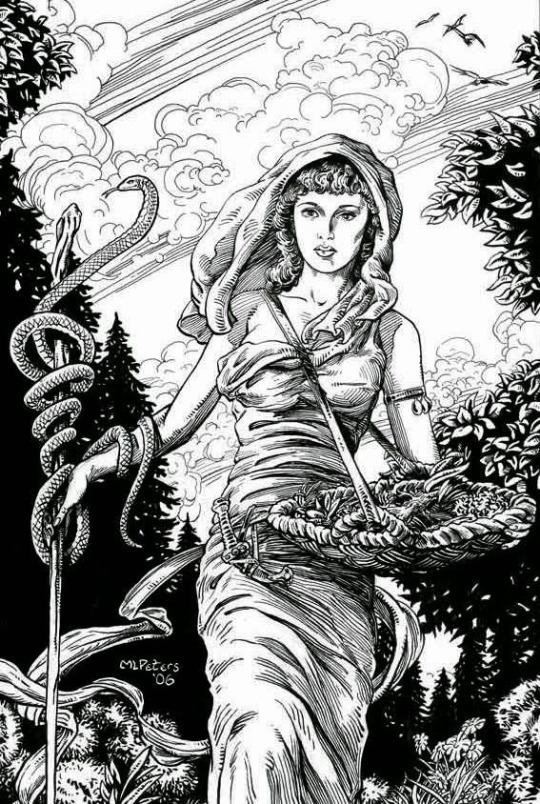
[ source ]
Her name means 'panacea,' which is actually defined as a remedy for all diseases. Terminal diseases and injuries lead to death, right? This would bring us back to Yosano's ability to nullify any injury's effects on a person, keeping them from death itself.
Now, we know that in order for Yosano's ability to work, her patient, or victim, has to be in a near-death condition in order for her treatment to take effect. This can't exactly fit into the description of resurrection, but it can be described as some sort of rebirth.
GREEK GODDESS PERSEPHONE
So another goddess which reminds me of Sho Ho/Yosano, is Persephone, the goddess of spring and rebirth. Before Hades, the god of the underworld, fell in love with Persephone to take her to live with him, Persephone lived a happy life.
Hades, with his nature of darkness and the like, was captivated by how pure Persephone was, and stole her away from her former life to live in an environment which differed sharply from her natural aura of purity.
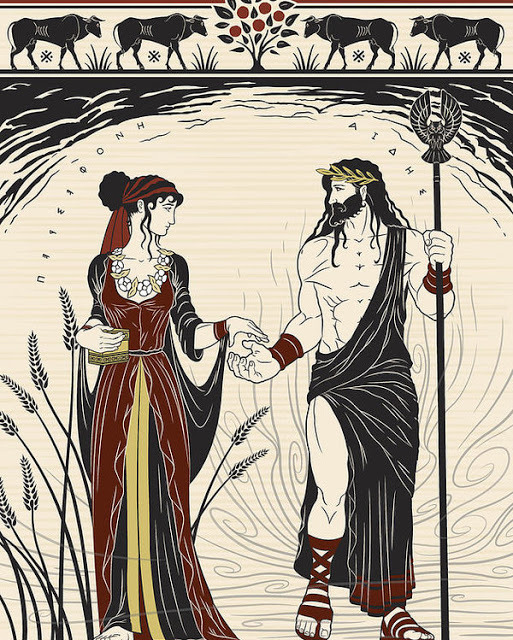
[ source ]
Remember when Yosano's friend left a note behind before he killed himself? The note said nothing except for, "You are too righteous." Take that as you will, but figuratively speaking, you could say Mori takes the role of Hades in the story, while Yosano can be portrayed as Persephone.
Sho Ho can also be a parallel of Persephone, in that she had to adapt to the realities of war and disharmony, while Persephone had to adapt to the raw darkness of the underworld with Hades.
Sho Ho stood against society's norms and decided to reform it, making her one of the most well-known feministic pacifist in history, while Persephone managed to escape from the underworld to return to her former position, earning the title the 'Bringer of Life,' or the 'Destroyer of Death.'
Furthermore, the way Sho Ho's anti-war poem took its effect later on, reflects the way Persephone restored balance in the world after returning from the underworld.
4. Yosano and Atsushi.
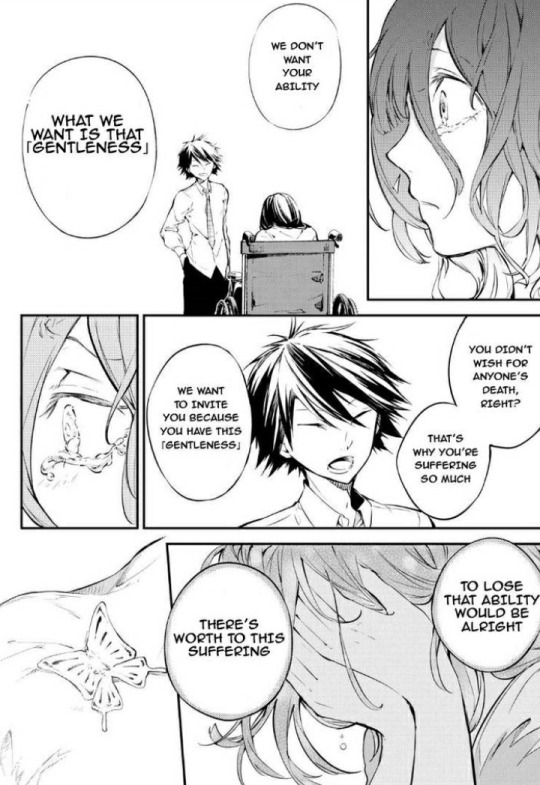
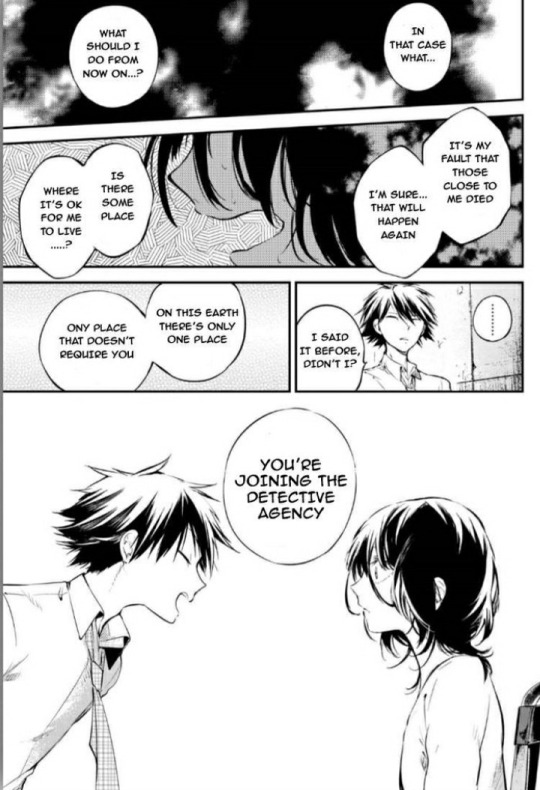
chapter 66; Yosano: "It's my fault that those close to me died... Is there some place where it's okay for me to live?"
chapter 8; Atsushi: "If I have any chance of saving them all, of returning them home safely, would that mean it's okay for me to keep on living?"
I couldn't help but think of Dazai and Atsushi back when I was reading through these panels. Ranpo (my beloved), along with Fukuzawa, accepted Yosano as she was, despite how her ability was a cause of despair and misfortune.
Ranpo looked past her mistakes and the entirety of how dark her past was to welcome her into the Armed Detective Agency. Dazai, on the other hand, knew who Atsushi was and what his ability had made him do before anyone else, and still decided to provide a safe place for Atsushi to find his sense of belonging, journeying with him as he learned to use his ability properly.
For more info about Dazai and Atsushi's dynamic, you can check out the analysis I did for Dazai :D
Atsushi desired to save people to prove his right to live, while Yosano made her wish to achieve the recovery of all her patients the reason for her existence.
Others would prefer to accuse both Yosano and Atsushi of having a saviour complex, but the reason why they pursued to save people with utmost dedication, stems from the nature of what their past was like. You know the saying 'from broken to beautiful?' Yeah, it's something like that.
The way their pasts were written out gave them a desire to change, which was, I daresay, initiated by the people who took them in: Ranpo and Dazai. Their abilities were demonised because of how they were used, but once they broke from their abilities' effect over their lives, they honed their skills to control them for the right cause instead.
In a less cynical point of view, I believe both Yosano and Atsushi stood for what was right, and wanted nothing but to achieve peace and harmony in whatever way they could, even if it meant risking their own lives to save others.
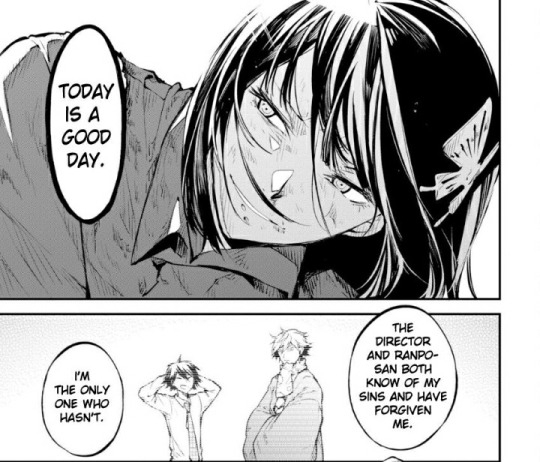
So yeah, that's it for my rants today. Thank you for reading, and if you have anything to add, go ahead! I'm open to discussions ;)
#bsd#bsd atsushi#bsd yosano#bungou stray dogs#bungo stray dogs#bsd characters#bsd analysis#literature analysis#bsd abilities#bsd anime#bsd manga#bungo stray dogs atsushi#bungou stray dogs atsushi#bungou stray dogs yosano#bsd dazai#bsd mori#bsd ranpo#character analysis#.daydreams
177 notes
·
View notes
Note
Hi Fedon, I hope you are having a good weekend! I was thinking of the primary characters and their foils and parallel characters. A few I know of are: Dany/Cersi parallels, Jon/Sansa parallels, Dany/Jon foils, Dany/Stanis parallels, Jon/Theon foils, Sansa/Cersi foils, Jon/Jamie foils. Do you have some parallels/foils for Tyrion, Bran, Arya? Are there any particular foil/parallel characters that are your favorite?
Hi there!
and sorry for answering two weeks later.
I really, really love the Jon/Jaime parallels and their set-up as foils.
I've liked Jaime since book 1 (yes, I liked him before he got a PoV) and I'm very interested where that will lead (still not bought on Tyrion as Hand, lol).
Another thing I really like is Jon/Sansa. I would not call it parallels though. I think it's more like complimentary puzzle pieces that will make perfect sense when they finally meet each other again.
I'm not that much of a fan of all the Dany things and that's because her chapters make me angry, lol. I like the Cersei/Dany parallels though and Cersei/Sansa foils, maybe because I have a soft spot for Cersei.
Now as for Bran, Tyrion, Arya. This is actually a very interesting question. I think that Bran and Arya and their darker path in comporison to Jon and Sansa is an interesting parallel. All of the Stark PoVs have "evil" mentors, but Bloodraven and the kindly old man are even more sinister than Littlefinger and Stannis (and that's saying something!). So I think that Bran and Arya have parallels in the sense that they will reach a dark low point that Jon and Sansa will not touch. I also think that Arya has parallels with Cat's story line. She's connected to the Riverlands and there are many parallels between her and Cat, one that comes to my mind is how mud, the combination of earth and water (and maybe the magic of the children) occur very often in their PoVs. Arya goes well beyond Cat's wish to find a place for a competent woman in their society. I think Cat's probing at the boundaries is often overlooked because it is much more subtle than Arya's. Sansa retraces Ned's journey and Arya Cat's (at least until the Red Wedding 2.0.).
Arya might also have some parallels to Asha - a woman who is already confident in a role that is not traditional. Asha at the same time is maybe set up to be the future of the Iron Islands. She wanted peace after all.
I must admit that I'm not sure about Bran's parallels. His journey seems to be more or less unique. It is the only story that has real magic in it and Bran is exceptional. He does have some parallels to Sam - at least they both share a thirst for knowledge although it seems to come more natural to Sam who never really wanted to be a knight. I also think that Brienne and Sam are foils in that regard. Sam is a man with "feminine" traits who wants to escape the expectations of his gender and Brienne is a woman with "masculine" traits who wants to find her own niche. Ultimately it is easier for Sam, because learning and studying to become a maester is an alternative for a man (it's only his father who is a dick about the maesters). In the end Bran will deny Bloodraven I think, but we don't know enough about Bloodraven yet to decide if he is a foil.
To me, Tyrion is the most difficult. He has parallels to everyone who is vengeful and in that regard his dark path, has parallels to Dany and Arya. Jaime is also a foil to Tyrion, not only in his own head but also in how they both try to reenact their father's legacy. In my humble opinion, Jaime's attempt at bringing peace to the Riverlands is a misunderstanding of his father's legacy (and at one point I want to do a meta on that), while Tyrion is as Genna Lannister tells us "Tywin's son". So, while all the Lannisters have a problem with their father's legacy, it is Tyrion who really embraces it, including all the narcissist, brutal and tyrannical inclinations that are veiled under an illusion of "pragmatic politics". (sry, not sry, I dislike Tyrion very much).
I wonder if Tyrion will have parallels to Davos just like Dany has to Stannis. Will Tyrion see Dany as his goddess just like Davos sees Stannis as his god? He definitely sees Dany as a chance to get what he thinks he should get (which is Casterly Rock) and I wonder if he will become as blind as Davos - or if he will just pretend to worship Dany. Both would work as parallels I think: The blind worshipping follower and the person who just pretends to be one and both wreak havoc because of their loyalty.
As @princess-in-a-tower told me, Jon is Tyrion's foils when it comes to how they treat women (look up her 'Beauty and the Beast' meta on that).
And Sam is a foil to Tyrion as well. Both are interested in learning (their shitty fathers are not that different either) but Sam wants to do good with it while Tyrion just wants his own advantage. Sam is also someone who meddles with politics, just like Tyrion (election of the LC!) but he is far more altruistic about it.
So, that's what I come up with at the top of my head. I'm sure there is more, more secondary and tertiary characters who have parallels to Tyrion and Arya.
Not necessarily to Bran though. He might be unique for a reason. Melisandre is another "magical" person but my mind draws a blank when it comes to parallels/foils to Bran.
Thanks!
19 notes
·
View notes
Text
Wonder Egg Priority finale thoughts
My Tumblr has a lot of anti-bully content, so it was probably no surprise when I began to watch and enjoy Wonder Egg Project this past spring. The series famously hit production delays that forced them to put out a mid-series recap episode, and that decision in turn forced them to push the final episode until late June. But now that the series (or at least season 1) is out there and complete, I thought I’d talk about how it all shook out in the end as well as the questions it left me sitting with.
For the uninitiated, here’s a bit of the context: Wonder Egg Project deals with four middle-school teen girls who’ve undergone hardships either at home or at school or both. They all lose someone they care about to tragic suicides, and then they discover the titular wonder eggs. They get these eggs from a vending machine and then, when they fall asleep, they enter a dreamworld where these eggs hatch to reveal a young person who recently committed suicide. For that night, it is the duty of the girl who got that egg to fight and defend that suicide victim from monstrous enemies that represent their abusers and oppressors. The girls are told that if they protect enough of these victims over many nights, they will be able to resurrect the specific person they lost to suicide. But of course, if you get injured or killed in the dreamworld, it affects your body in reality as well.
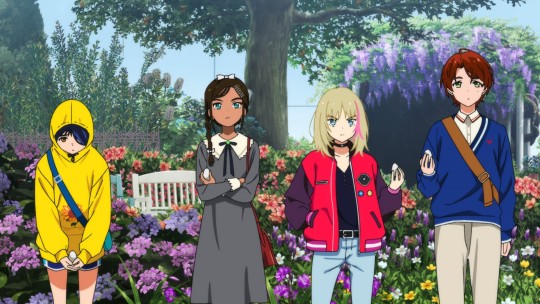
The squad: Ai, Neiru, Rika, and Momoe.
Obviously, bullying is among the topics most frequently explored here, but we also deal with so many other terrible things that people might experience during childhood and adolescence. Physical, verbal, and sexual abuse are all on the table. Coming to terms with one’s gender identity is raised. It’s a show that manages to tackle a lot of heavy subjects through the lens of what’s essentially magical girl combat. I mean, there are no outfit transformations or any of that stuff, but still.
With THAT out of the way, let me talk about how the series wrapped up.
It’s clear to the viewers that there’s a lot that doesn’t make sense during the show — it’s intentionally very trippy and ethereal at times — and there’s also a lot that raises obvious questions even if you grasp it. Where do the eggs and their connection to the recently deceased come from? How do the psychological traumas of the various egg-children manifest as monsters that can literally kill you? What’s the deal with Acca and Ura-Acca and their freaky dummy bodies? What are they getting out of this whole deal with the eggs and the girls? What do the repeated references to the “temptation of death” mean? How does access to the Egg Garden even work? Is it really possible to resurrect their dead friends? Is Mr. Sawaki a predator or a chill guy or what? Why did Neiru’s sister stab her? And so on.
The writers could’ve opted to keep things mysterious and hazy and metaphysical for the entire run or they could’ve provided lots of explanations and tried to ground this weird story in some sort of strange logic, but I’m actually pleased that they opted to go down the middle. There are answers for many things, but not for all. And when those answers come, they typically just raise more questions as well as doubts to their validity.
SPOILERS for the finale/”special episode” below the cut.
So, obviously the answers for Acca and Ura-Acca are centered around Frill. Frill is this interesting fusion between the artificial and the organic; her body can be injured like any regular physical body, but she’s actually an A.I. on the inside. Acca and Ura-Acca are the exact reverse of this — they’re human minds inside of completely artificial bodies. Exactly how Frill started invading girls’ minds to lure them towards suicide is kept incredibly vague, but she serves as the embodiment of the “temptation of death” that was so-often referenced in the show. Frill doesn’t really appreciate life or care about the finality of death, making her a pretty natural foe for the heroes who have spent the entire series learning to appreciate their lives and bemoaning painful losses.
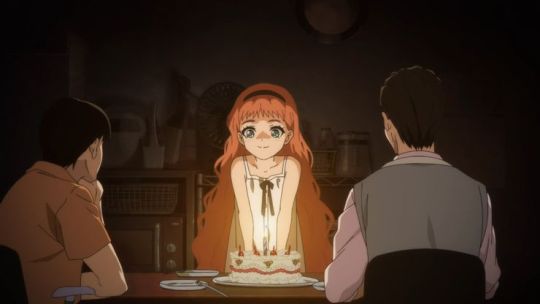
Can you even believe this bitch?
Acca and Ura-Acca also have documents talking about how warriors of Eros need to battle against Thanatos, the embodiment of death, but what’s that all about? We don’t really get into it. Is Frill somehow Thanatos herself? I mean... I guess maybe you could go that route, but I sincerely don’t think that’s meant to be the case. I assume she’s just another player in the game, and she happens to have taken Thanatos’ side in things. Her artificial existence and resentment of her fathers leads her to treat death flippantly. She was programmed to be selfish sometimes, and that selfishness has ultimately manifested itself in the worst possible ways. Intriguingly, we see Acca and Ura-Acca act similarly selfish in how they drive our four heroes to risk their lives just to battle Frill. Acca in particular shows that he’ll risk anyone’s life to get to Frill, who killed both his wife and daughter. But Acca never has to risk his own life. He’s just risking other people. Both sides of the equation are treating human lives like disposable pawns in some kind of war game.
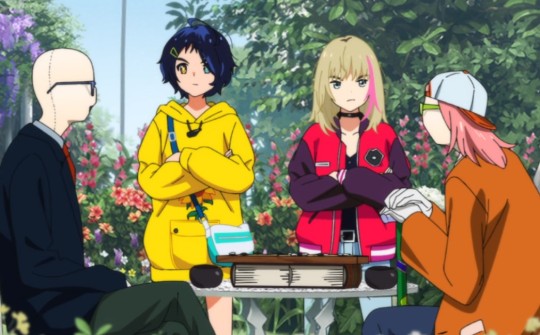
Y’all are SUPER-SKETCH.
It’s never really clear how these eggs work. We’re told that the Accas created the eggs, and honestly, I could’ve figured as much on my own. But they don’t try to explain how the eggs can contain the souls of suicide victims or how they manifest those people into dreams, and frankly, it’s probably better not to try.
I was really shocked that the girls actually manage to resurrect their dead friends. I was 100% certain that was going to be a scam and the point was going to be about learning to move on and live for the moment and appreciate those bonds while you had them, etc. And there is some of that. Alas, the price of resurrecting those people they care about is that the people in question no longer know them or remember them. That was pretty brutal... having our heroes nearly die over and over in service of people who ultimately will no longer care about them at all. Although they did the impossible and brought someone back to life, they had to lose those people all over again. I suppose this, like much fo the finale, emphasizes that we should appreciate our relationships while they last, because you can lose them for so many reasons. Regardless, I’m not surprised that Momoe just wanted to quit and avoid getting hurt after that. It’s understandable.
There’s a lot of discussion around parallels in the last two episodes. Parallel worlds with alternate versions of the self are raised multiple times, Ai gets an awesome encounter with a parallel version of herself that really brought her emotional journey to a head, and we even have to deal with a doppleganger of Neiru at the end. This leads to the revelation that Neiru looks exactly like her formerly deceased sister... a fact that presumably was part of what drove the sister to attack Neiru in the first place. Given that we’ve already been told that they were both genetically engineered, their identical appearances don’ seem that strange. But then the finale tells us that Neiru’s one dream is “to be human,” and suddenly the characters assume Neiru was an A.I. just like Frill. That... seems like a leap to me. I mean, she was genetically engineered to lead her company and never had a family of her own; no wonder she feels inhuman! So I’m not sure if I should take this at face value.
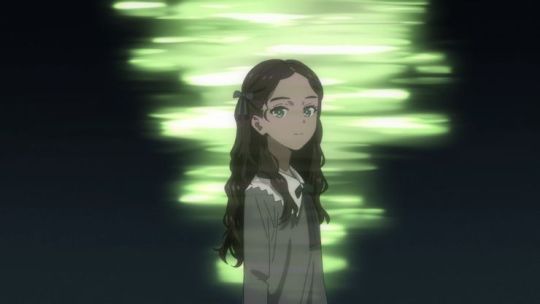
Neiru real or fake challenge
Another thing that I don’t think we can take at face value is Mr. Sawaki’s explanation of Koito’s death. In episode 12, we meet a parallel version of Ai who actually killed herself. The big boss monster for Ai to fight while protecting Alt-Ai? It’s a dark, abusive version of Sawaki. And our Ai inexplicably assumes this monster was made from her own fears. A very bizarre conclusion to jump to when you remember that every single boss monster has been the abuser of the victim that the girls were defending in that episode. By all available evidence, the Sawaki monster should be a parallel-world Sawaki who is very much exactly the scumbag he appears to be! Notice how Alt-Ai never says a damn word about the Sawaki Monster - never asks who he is or why he’s like this, etc? She’s not even surprised. That just lends further credence to my belief. FOLLOW THE EVIDENCE.
So in the finale, when our version of Mr. Sawaki claims (via a VERY awkwardly inserted voiceover) that Koito’s death was an accident after she tried to ruin his reputation because she fell in love with him, why should I believe any of it?! The previous episode introduced me to Abusive Sawaki! Sure, we don’t have any reason to assume our Sawaki is That Dick, but we JUST learned that he’s certainly capable. Furthermore, how could Koito suddenly be the ONLY accidental death among all of the available suicide victims in the dreamworld? She shouldn’t have even appeared there if it was just an accident! Although I’d like to believe that Sawaki was someone who Ai and the girls were jumping to conclusions about based on nothing... but it sure doesn’t look that way from here. And given how the show ends things, I fear we may have a hard time learning anything else about Sawaki. Ai changes schools and runs away, there is zero comment on what happened to Sawaki’s relationship with her mom... he’s just gone now.
As the final episode winds down, we see Rika and Ai fall back into bad habits, as they all treat Neiru just like they treated the girls they tried so hard to save. Rika acts disgusted by a friend and abandons her, treating Neiru the same way she treated Cheimi. When Neiru finally reaches out to Ai and calls her, Ai ignores the call and throws her phone away, thereby ignoring her friend’s needs in the same way she ignored Koito’s when she failed to record the bullying Koito was experiencing. You might even be able to connect Momoe’s choice to walk away for the sake of self-preservation to her decision to reject Haruka and walk away, honestly. And to compound the bad news that the show gives us near the end, we skip forward months to learn that Ai, Rika and Momoe have all drifted apart. Ai is in a new school, but we don’t see her with any new friends. She’s back where she started the show.
The difference, however, is that she doesn’t seem hopeless and lonely. She seems wistful, sure, but she never seems beaten down. She still treasures the friendships she built even if they wind up fading away. So there’s still a message in here about moving on, because even if you lose a person or a connection, it will forever matter.
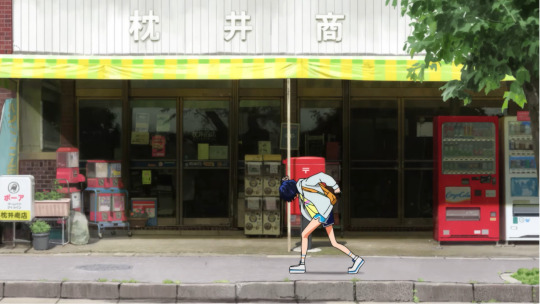
*insert engine rev-up noises*
In the final moments, we see Ai preparing to run in the exact same pose she used back in episode 1 when she first stood up to the abusers within the dreamworld. This time, she runs to grab her chance to reunite with a dear friend. She takes charge of her own future and her own self-worth, somehow gets back into the Egg Garden (even though Rika wasn’t even allowed to enter after she rescued her specified victim, so uh... how did Ai get back in exactly... ?), and insists she’s going to use the eggs to see Neiru... even though the eggs only let you see the dead up to this point, so uh, that doesn’t really make any sense either. Consistency, motherfucker — DO YOU USE IT?
Amidst all the uncertainty that the finale left us with, at least we can see Ai find herself in a more confident place. She spends much of the series learning to stop running from her problems in the real world. Even after she gains confidence in the battles of her dreams, she struggles to face reality. It’s a huge step when she returns to school. Yet even in the very last episode, she opts to run away to a new school rather than cope with seeing Koito each day. But at last, she decides to take charge of her reality and try to reunite with her new best friend, Neiru. She’s wavered on her path, but ultimately, she’s grown. Although you could simultaneously argue that she’s failing to learn the lesson that rescuing Koito should’ve taught her...
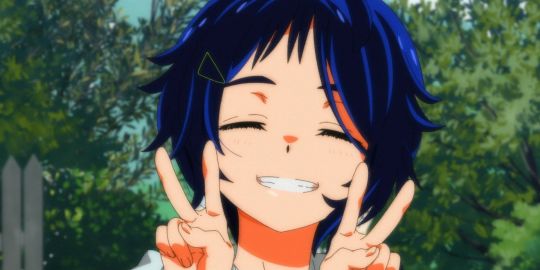
“Ai Ohto is BACK!”
I don’t think any of us expected this finale to be a cliffhanger coming into it. And unfortunately, we don’t know if there will ever be another season or a movie or anything. Given how people reacted to this finale with such overt hate, I really don’t expect anything more. And I think that would be a goddamn shame. Even with a finale that doesn’t quite stick the landing, I still found it fascinating and engaging. The series is more than worth the trip for the characters, for the themes and topics it explores, and even for the fluid action scenes and music. And this is a series that was made by first-time writers and a first-time director! Yet I’d easily call it one of the best animes from the past couple of years. For total newcomers, that’s a goddamn TRIUMPH.
So I hope we reunite with these girls again. I hope Ai manages to get the band back together, find out exactly what’s going on with Neiru, and face down Frill. Even if they never wind up in some ultimate battle with Thanatos, I don’t know that that’s the point. All of us are in a battle with Thanatos every single day, after all. They just need to show how they’ve all gotten stronger together and truly overcome the “Temptation of Death” by beating back Frill (and her ridiculously powerful dreamworld bug-people) as a unit.
But maybe that’s too obvious and simplistic of a message for a show like this one. Maybe this complex ending centered on the main protagonist’s self-actualization and the value of fleeing relationships is more in keeping with the melancholy nature of the series.
... I still really want to see the more obvious happy ending, though. I think they deserve it.
#wonder egg priority#ai ohto#wep#anime#anime reviews#wonder egg special episode#wonder egg priority special episode#wonder egg priority finale#wonder egg finale#wonder egg
48 notes
·
View notes
Text
girlbosses, male wives, and other lesbian genders
a post about jing wei qing shang. but also mostly about another unrelated movie. spoiler-free.
for a lot of people, mulan 1998 is their definitive “ohhh i’m a chinese woman dressing as a man for contrived reasons and i get absolutely nooo erotic pleasure from this” movie.
however, because i am very special and unique, for me it’s the love eterne 1963. it’s the shaw brothers adaptation of butterfly lovers, the classic chinese folktale. here’s how i’d summarize the movie:
zhu yingtai, an aspiring scholar, convinces her parents to let her dress as a man to attend school. on the way there, she meets liang shanbo, another prospective student, and they become sworn brothers. they study together for three years, growing closer, until zhu yingtai returns home. liang shangbo accompanies her for the eighteen-li journey home while she hints she’s a woman, but he remains oblivious. by the time he learns her gender, her parents have engaged her to another man. he dies of grief, and while she mourns at his grave, it splits open, and she buries herself inside with him. two scraps of her torn outfit turn into butterflies and fly away.
it’s worth noting here that like. this movie is made in the huangmei opera style. so both zhu yingtai and liang shanbo are played by women (betty loh ti and ivy ling po respectively). because of this, basically every level of the film is preoccupied with gender: if we take zhu yingtai’s male performance as credible (as the characters in the movie do) the leads bond through male homoeroticism; the text is ultimately about a heterosexual romance; it is acted out by two women, in a performance that is difficult to mistake as heterosexual or even feminine; and the dialogue of the movie can’t help but remark on this.
basically it asks: what if lesbians could be gay both ways? wouldn’t that be based?
like opera was traditionally made by single gender casts, so roles tended to be genderless, in that the gender of the actor doesn’t determine the gender of the role they play. roles are instead typed into four categories: dan (fem), sheng (masc), chou (clown), and jing (painted face). it’s a sick gender quadinary. each of these roles has further subtypes that are represented through stylized patterns of singing, makeup, costuming, movement etc.
so in butterfly lovers, betty loh ti plays a dan, and ivy ling po plays a sheng. but because of the textual cross-gender play, you end up with a woman playing a woman playing a man who falls in love with a woman playing a man.
i’m going to make a brief digression here into talking about like.. acting theory. in the european tradition, you see it evolving out of early concerns (from stanislavski, brecht) about the fourth wall, and its permeability or lack thereof. in chinese opera tradition, the fourth wall didn’t ever really exist. and mei lanfang, the legendary fanchuan performer, claimed that his success wasn’t just due to his appearance, but rather, his mastery of some nonliteral feminine subjectivity.
If I kept my male feelings, even just a trace, it will betray my true self; then how can I compete for the audience’s affection for feminine beauty and guile?
i’m not going to argue that there’s like, an essence to being a woman because i’m not a fucking idiot. but there’s something to be said for the idea that the gendered interplay between the audience’s perception of the actor, the actor’s perception of themself, and the character they play is a massive part of the appeal of fanchuan performance.
this is echoed by david hwang’s m. butterfly, in which gallimard memorably says, “i’m a man who loved a woman created by a man. everything else—simply falls short.” btw sorry for having the type of brain disease where i constantly reference chinese crossdressing related media. you already know why i have it.
anyway. parallel to that (but far less morally detestably), jin jiang argues “young male impersonators in yue opera embody women’s ideal men—elegant, graceful, capable, caring, gentle, and loyal.” so, trivially, 1) the eroticism embodied by fanchuan performers is distinctly different from their “straight” counterparts, and perhaps less trivially 2) it’s way better.
back to the love eterne for a bit. one of the many reasons it’s lodged itself into my psyche is because there’s something more interesting at play than just all that. normally in opera, to compensate for any perceived residual femininity in the sheng, the dan camps it up even further. so this is how zhu yingtai first appears, this bratty femme pastiche of womanhood. yet within a couple minutes she’s dressed as a man, which she’ll stay as for the bulk of the movie. they do however make compromises with the makeup--more gently lifted eyebrows than the steep angles of the sheng opera beat, and an improbably masculine smoky eye.
that’s right. they performed girlbossification on her.
i don’t want to suggest that she’s straightforwardly feminine. i could write an entire other thing on her relationship to masculinity. instead i want to highlight the erotic interplay not just between the “girl” and the “boss” but also between her and her counterpart: the male wife.
liang shanbo is ostensibly straightforwardly male, but his relationship with zhu yingtai isn’t gay in the ahaha what if i was into my bro way-- it’s a what if i was into my bro and i was his wife way.
that’s right. they performed force fem on a cis woman-man. like when zhu yingtai tells him he can’t watch over her as she recovers from an illness because “boys and girls can’t sleep together,” liang shanbo asks “are you implying that I’m a girl?”
there’s a lot of shit like this that builds up over the course of the movie. it all culminates in that final 18 mile journey. along the way, zhu yingtai compares them to a pair of mandarin ducks, one male & one female. liang shanbo sputters “i am a man inside out-- you shouldn’t--” before graciously conceding, “you may compare me to a woman.”
this is like. a simple punchline. but it’s incredible. it’s true! liang shanbo isn’t a man inside out in that he’s a man and only a man, but rather that he’s a man seen inside first, built for desiring, by a woman & for a woman. as a perpetual object, he becomes a more believable woman than zhu yingtai. and at least in his view, it seems more likely that he could be a woman than her. but beyond that, his permissive tone reads as a kind of wanting in itself--recast, if she wants, “for you, i’ll be a woman.”
obviously this is a classic lesbian mood. who among us has not seen “no gender only lesbian” posts. and speaking of classic lesbians, you might ask. did you just tiresomely reinvent butches and femmes but with a more annoying name? yes. no. okay. well.
first, like butch/femme dynamics have both historical specificity and a classed character such that it’s not rlly that appropriate to impose them on the love eterne. and i guess more importantly, i wanna talk about stuff that isn’t real.
we fight all day about people who confuse performance with performativity, (i use we lightly here. for instance, i go outside every day so i don’t care about discourse) but what if we actually wanted to talk about the former for once? something specifically, whether we choose or are forced into it, that we pretend to be?
anyway. what the hell does all that have to do with jing wei qing shang. i’m going to start by first making the argument that there’s no such thing as a naturally occurring girlboss. i think, honestly, she’s a product of capitalism (“boss” should be the tipoff here) but because both of these stories are set in ambiguously historical china, i’m going to say, instead that she’s a product of uhhh primitive accumulation.
semantics so that i can be canon compliant with marxism aside, if girlbosses are made not born, can you choose to be a girlboss? sheryl sandberg says yes. i don’t disagree, i guess, but i will say: stop glamorizing it! humans only become girlbosses when they’re greatly distressed.
you become a girlboss when you have no other choice not to be one. when your wants are too great to be a woman, when the things you want are not things that women should want-- whether that’s something that really no one should want, like being a ceo, or whether that’s just something like loving a woman (or, as it is quite often, both) -- you have to become something else.
another important part of being a girlboss is that other people are not. your excesses mean that not only do you lose something in the process, but your bosshood comes at the expense of others. the girlboss necessitates a girlworker, or so to speak.
now we’re getting to jwqs. i’m assuming that you haven’t read jwqs, because most people haven’t. that was me until like four days ago. in broad strokes, the novel is about a woman, qiyan agula, who was raised as a prince, and her quest for revenge against the kingdom who slaughtered her people. of course, this involves marrying one of the princesses of that kingdom. it’s all very exciting (lesbian).
what’s striking about jwqs is that both of them seem to fit the girlboss paradigm, in vaguely similar ways. qi yan (agula’s assumed name) seems to follow the lineage of zhu yingtai, who pretends to be a man to achieve her goals. she’s forced to give up much in the process, and also sacrifices a, uh, lot of innocent people. similarly, nangong jingnu, the princess, is inherently a girlboss because royalty sucks. but also, qi yan girlbossifies her over the course of their relationship.
but i wouldn’t say jwqs is girlboss4girlboss. there’s something a little more complicated happening. qi yan isn’t zhu yingtai in that she’s a dan pretending to be a sheng. it seems more like that she was a sheng all along. it’s something that the women of the novel return to often: qi yan seems to be better than a man.
for instance, nangong sunu, jingnu’s older sister, reflects on this.
Nangong Sunu had seen many foolishly loving women who sacrificed everything for the sake of their husbands, but there were rarely any men who would do the same for them.
(...)
Thinking it through, Nangong Sunu felt that Qi Yan was truly becoming more interesting. She intended to observe discreetly for a while, to verify if such a man truly existed in this world. (ch 221)
and i forgot to write down the citation for this, but nangong jingnu also seems to argue that not only is qi yan prettier than a man, but she also seems to be prettier than a woman. (it’s the bit where she’s watching qi yan sleep. help me out here.)
moreover, the way qi yan relates to nangong jingnu is suggestive. jingnu brings out the elements of wanting to be a woman in her. it’s jingnu’s body that makes her wonder what she would look like if she was more feminine. it’s jingnu’s happiness that she resents, wishing that her people could have that as well. it’s her desire for jingnu that makes her a woman.
(another important distinction i suppose--while one person can’t be both a butch and a femme, because the girlboss and the male wife are things we pretend to be until we embody them / them us -- there’s greater slippage between the two.)
anyway, the girlboss/male wife dynamic is reversed wrt who’s actually dressing as a different gender. that suggests an inversion in the implications we see from the love eterne, if we are to take the love eterne as the paradigmatic girlboss text. which i do, for no reason in particular.
so then, is qi yan pretending to be a man? under the opera framework, we’re forced to say no. she’s not pretending to be a man any more so than liang shanbo (as acted by ivy ling po) was. but that, of course, feels incorrect, just looking at the text. is she, then, pretending to be a sheng? i’d strongly say no. the things that others see in her, they authentically see; and she does authentically feel the same things as liang shanbo wrt femininity.
so it has to be the opera framework that jwqs is subverting then. if qi yan kept some trace of her once-womanhood, if qi yan reveals her true self, and yet she still can compete for the audience’s affection-- jwqs’s inversion of the opera framework seems to argue instead that it’s that true self that allows you to compete. it’s being masc that lets you be a desirable woman; it’s being feminine that lets you be a desirable man.
there’s an increased gender ambivalence to jwqs, which make sense, i guess, seeing as it’s not meant to be a het story the way that the love eterne was. for instance, nangong jingnu crossdresses to go out in public, and qi yan remarks that jingnu’s disguise fooled her on their first meeting. when qi yan and jingnu go out in public, both disguised as men, they’re repeatedly perceived as a gay male couple. there’s freedom in that: they could be gay women only privately, they could be straight officially, but they could be anonymously gay publicly.
so it’s through the gay male pretense that they can be gay women; it’s through the qi yan pretense that agula can love women; it’s the qi yan caring husband persona that coaxes jingnu in caring for qi yan in return-- jwqs, more precisely, argues that you can’t be a woman if you’re going to love them, and even less so if you’re going to be loved by one.
this is perhaps well-trodden ground for anyone who has read wittig & certainly many people who haven’t. but it’s the layer of pretense that for me complicates these two narratives.
i think it’s a relatable feeling: wanting something anticipating getting something, or wanting something for yourself anticipating knowing that you already had it. that is, desire in itself being constitutive of that reality.
or less abstractly, knowing that you’d want to be a lesbian if you could, knowing that you’d want not to be a woman if you could-- anticipating any realization of either.
the dramatic excesses & wants of the girlboss, i think, are a decent literary stand in for being a lesbian.
i wanna note here that this is rlly just based on my experience being a transmisogyny exempt nonbinary diaspora lesbian lol. it’s fun & cathartic to overread this history & place myself in the accidental implications.
i don’t think most of the things i say are literally true. and i don’t want to overstep & say any of this can be generalized. please lmk if something here doesn’t read right! ok kisses bye
172 notes
·
View notes
Text
[“It was mad. I’m just fucking standing there with this beautiful mic, in this beautiful studio, in this beautiful place,” says Tempest of the album recording sessions. “As you start you’re like ‘okay I’m gonna start in a minute and then when I start it’s 45 minutes before I stop, so I need to be in this right now’.” But Tempest is no stranger to this kind of endurance performance, having toured her 75-minute narrative poem, Brand New Ancients (though it’s demanding and often violent content would push her to her limit).
“There’s something interesting that happens when all the words are said at the same time,” Tempest muses, “they have all this relevance to each other. Something that happens in the second song, suddenly it’s holding hands with something that happens eight songs later — there’s these links that happen between words that would never happen if you stopped and recorded these tracks separately, so it gives this feeling of mad communication happening between the lyrics.”
(…) For Tempest relationships are the “front line” in this battle, a place where you can’t hide anything, where you come face-to-face with how you’re coping and how your experiences are manifesting in your behaviour. In short, a self-awareness on a level that allows you to be able to zone in and say: ‘this is what I’ve just done and this is everything around me that has influenced this moment’.
Talk turns to Tempests own relationships and “Firesmoker”, the tender expression of queer love and first single to be lifted from Traps and Lessons. “I wanted that to be the lead single because it’s just a beautiful articulation of queer love,” says Tempest. “It’s a powerful thing to stand up and make these proclamations about sexuality to women. So often those depictions of two women together are controlled, and directed, and written by heterosexual men — this idea of what two women together is, what it means, what you see when you see that in popular culture.”
“It took me a long time to be able to stand with my own queerness and where I sit on the gender spectrum. That journey, for me, has been a challenging journey… To be able to just articulate something beautiful and positive about this experience and to be able to just stand on stage and just be in my presence, and in my body, and the fact that I’m even there at all — that’s powerful for somebody in the audience going through their own journey with their sexuality or gender. I feel that.”
(….)
“The system that we live in, one of the things it does is that it creates factionism, violence, it creates a desire amongst rootless people who are nothing but agents of consumption — this is what we are useful for and this is the role we’ve been given, this is literally what we are for within our system. It creates a desire for a kind of chauvinist male leader to give us some kind of violent solution. Stalin and Hitler have been written out of the Western progressive capitalist story as if they were these freak occurrences, but actually this is the conclusion of this system, it creates this, and it continues to create it, and it has never stopped creating it; and the myth that the West tells itself about its own progress is a convenient myth that allows this system to spread further and further afield.”
Tempest references the work of Pankaj Mishra and his book The Age of Anger, in which Mishra explains that we have forgotten the violence that happened at the dawn of capitalism and took root in industrialisation. Mishra traces these systems — which are dehumanising, exploitative systems that uproot communities and give people no agency beyond a role to play in a consuming machine — back to their roots.
“I think it’s worth saying that the solution to Brexit or anything else, is to realise that this is nothing new. This is what happens under the system we live in and the first step towards making a huge change is cognisense, being like, this is what’s happening in my behaviour, in your day to day relationships for example, this is what I’m doing, this is what’s happening. The first step to really being able to make a change within your own patterns is awareness and that takes education and careful thought.”
“If I am addicted, if I’m an alcoholic —which I have been for a long time — if I’m not aware of it, then I’m not ever going to decide to not have a drink. That might be a strange parallel to make but this system, another thing it does, it encourages numbness in us. It’s a requirement of the system — in order to function you must be numb. Creativity, poetry, literature, music, that’s one thing it can do, it can reconnect — for me anyway. When I’m at my numbest, often it’s creativity, someone else’s artistry, that brings me back and reconnects me, that’s why I might cry when I’m watching someone sing because I’m suddenly a human being again, I have my vitality back.”]
#kae tempest#lesbian poetry#trans poetry#they cut all their hair off and switched to they after this interview and GOD#terra preta#wasteland radio
26 notes
·
View notes
Text
We’re All Just Guys
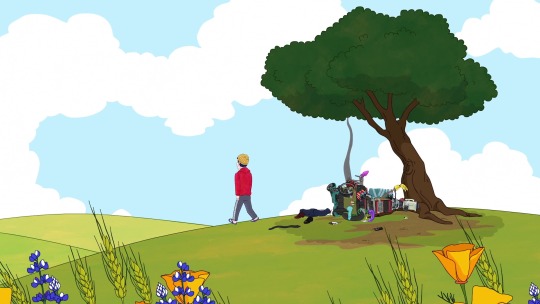
Well it took the entire fucking season, but I FINALLY get the purpose for Henry Fondle: Sex Robot. And while the entire episode (and season, honestly) has been tremendous, that this ridiculous fucking punchline was the vehicle to deliver the overarching point with a solid knockout punch of meaning AND pathos? Absolutely floored. That BoJack Horseman can be (and often is) brilliant isn’t a surprise, but the ways is keeps proving it often are.
So “The Stopped Show”, a tale of accountability and responsibility and how we’re all just guys.
Each of our main characters closes out this season alone (sort of), in assorted stages of realizing the main themes, or completely failing to. I find Diane’s arc the hardest for me to make a decision on, which isn’t surprising, as I think in many ways, Diane’s the most complicated character in the show. She delivers, directly and succinctly, one of the major points of not just this season but the entire show, but how does it relate to her? I’M NOT COMPLETELY SURE. I think part of the problem with (and for) Diane is that she knows better. She’s the most insightful character, she has a fantastic head on her shoulders, but only for everyone else. She’s this fucked up little disaster prophet, her vision clear and her message concise, unable to ever apply her gifts to fix herself.
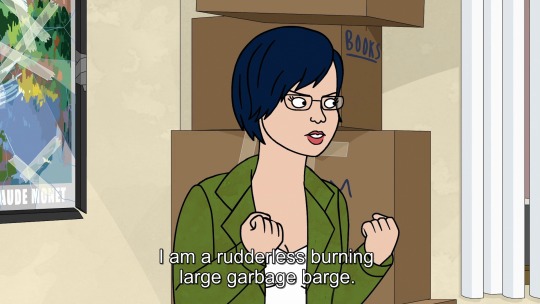
Diane is just as trapped as BoJack, but in a fun twist, is now lagging behind him in trying to do something about it. Nearly every single scene with Diane this season has been in this sad little room of her sad little apartment with all her sad little unpacked boxes, and no matter how much truth and wisdom she spits out, HERE SHE STILL IS, failing to correctly assemble IKEA furniture with names like Bȧcksleid. She already feels like shit for sleeping with Mr. Peanutbutter, so what does she do? THE SAME FUCKING THING. To which I groan and roll my eyes, while simultaneously being proud of her for directly and immediately setting him straight about not getting back together. Diane rides this constant line where she gets it but also doesn’t, which is so interesting to me in the level of additional frustration this makes me feel. BoJack is so self-absorbed you don’t really expect any better of him, which has the flip side of your expectations being so low that even the whiff of progress feels exceptional. Diane doesn’t come with any of that though, she knows better, you KNOW she knows better, and the consequence of this for the audience is that she winds up being more unlikeable than the guy who literally last episode nearly strangled his girlfriend and co-star in the middle of a paranoid drug-induced frenzy.
Which is fucked up! It’s intensely fucked up! And also, I think, the point! We expect more of Diane, and so feel more disappointed when she doesn’t deliver. Is that fair of us?
But there’s more here, as we pivot to the accountability portion of this episode/season. From the beginning of the show, it’s been incredibly upfront about how everything is unfair. We come back to this time and again. Privilege rules the day in the world of Hollywoo. Fame, money, charisma, gender, power. BoJack has been an asshole from pretty much the moment he set foot in the spotlight (possibly before?), and the only thing ever even attempting to hold him back has been the moments his guilt manages to scream loud enough to be heard over his internal narrative. Whatever he does, however he fucks up, he always stumbles back to his feet, and NEVER with any (broad scale) consequences. Meanwhile, here’s Diane, in her sad shitty apartment. Consequences haunt Diane, even if she’s the one doing the haunting. The crap things she’s done and the shitty choices she’s made cling to her.
There’s no fairness in that either, no justice. But Hollywoo (and the entire world around it) (and our world too oh yes) has that privilege carved into its bones, and Diane bears none of its marks. Her situation is very different from but parallel to Gina, who is just so fucked over, it keeps legitimately making me angry for her.
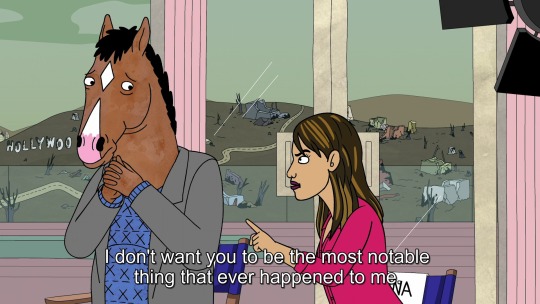
Gina, of course, brought none of this on herself. She made the mistake of caring about BoJack and trying to help him. OOPS YOU WERE A GENEROUS PERSON WITH AN OPEN HEART FUCK YOU LADY. For her trouble, Gina has been assaulted and traumatized, AND she is in very real danger of her career being over when it’s only just finally beginning. And she KNOWS THIS. That’s the part that I keep coming back to. All this should be an aberration, an anomaly, and while that may be true of the specifics, conceptually, it’s so commonplace that Gina already knows how it’s going to play. She’ll stop being Gina and become The Woman Nearly Strangled To Death By BoJack Horseman. Even if she’s able to keep working, this is what she’ll be asked about in every interview forever. Even if she convinced people to genuinely listen to her, BoJack would, at worst, get a slap on the wrist as he stumbles back to his feet. We know that, WE ALL KNOW THAT, because it happens all. the. fucking. time. Gina did nothing wrong, but this would still define her for the rest of her life, while for BoJack, it would maybe become a footnote on his Wikipedia page.
Nothing about that is FAIR. Nothing about it is JUST. Gina’s choices shouldn’t have to be “this becomes my entire life” or “swallow this down and pretend it never happened”. But it is, as it has been in perpetuity for the victims of the privileged.
So then what can we do about it? Well that’s really the question, isn’t it? This episode answers it in an assortment of ways (I think the entire SHOW is very much about this, really, but this episode is for sure coming with guns blazing), while also showing us why none of those answers can work. It’s funny and sad and awful and true, but also, ultimately, the most hopeful answer because it’s the only one you can actually affect: It’s you. It’s me. It’s each and every one of us, individually, making a choice to be better.
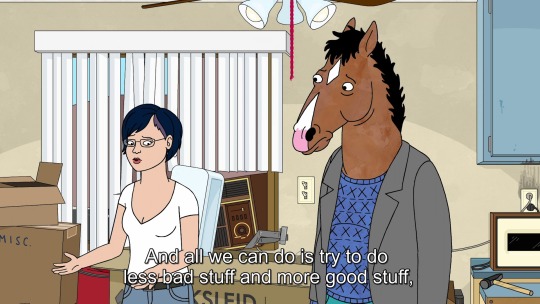
And believe it or not, we embody this with Henry Fondle: Sex Robot.
I thought the whole thing was so unbelievably stupid. Half the season, we’ve had this goddamn multi-dildo’d juvenile frat boy joke running around with its stupid ass Speak-and-Say voice, doing the same shtick over and over, and I’m like, “okay this is just the shit I have to put up with to get the clever stuff, I guess.” BUT THAT’S EXACTLY THE POINT I’M SITTING THERE LIVING THE ENTIRE GODDAMN POINT AND MISSING IT. Henry Fondle: Sex Robot is seventeen shades of overt horribleness, AND WE ALL JUST GIVE IT A PASS. It’s just the way it is, the way the world works, the price of doing business. When the whole time -- THE ENTIRE FUCKING TIME -- all it took was one person to say no. One person who could see the game we all are playing and was willing to give up everything to stop it.
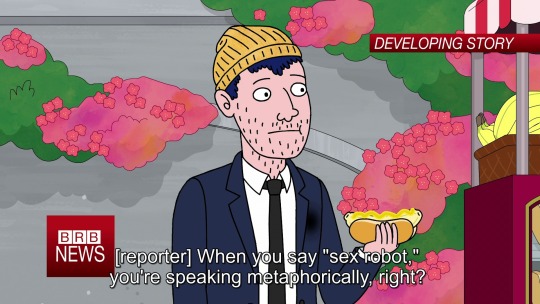
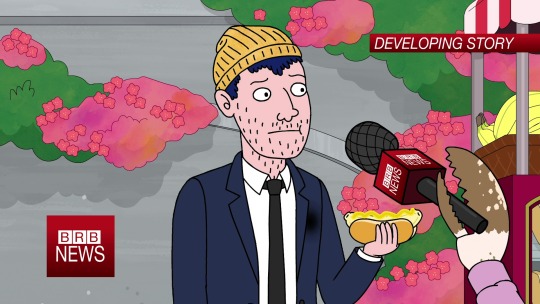
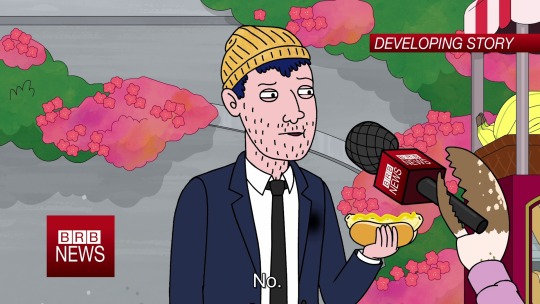
Hilariously, Henry Fondle IS a metaphor, sort of, but of the saddest kind. He is literally a robot, he can’t possibly change. What’s more, media fervor will never affect him, fallout will never touch him, and the powerful will always rally around themselves to retain their power. It takes Todd, the head of the company, the creator of Henry Fondle, and the one person who would benefit most from the unending efforts of the rest of the world bending over backwards to avoid the truth, to put a stop to it. In doing so, he immediately returns to his old, homeless, destitute self, but doesn’t once hesitate or look back.
It’s Todd, and only Todd, that stops that madness, because while individual people are a problem, the world at large is too. Stefani makes a great point that Diane holds herself and everyone else to impossible standards and a little forgiveness and grace wouldn’t go amiss, but when Diane suggests they apply that philosophy to their clickbait gossipy shit on their website, it’s just
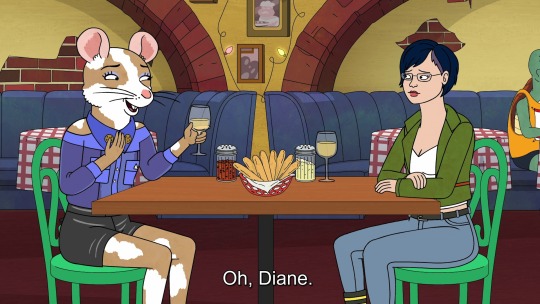
Which again, is beautifully cynical and depressing, but not untrue. Fostering a more forgiving culture isn’t in stopping websites from posting clickbaity takedown articles, it’s each person deciding not to take the clickbait. We can absolutely have a conversation about the people creating their world or the world creating its people, but when you boil it down, only one of those things can you yourself absolutely and directly change, and it’s not the entire world.
A THING DIANE GETS BUT SIMULTANEOUSLY ABSOLUTELY DOES NOT.
I can’t take myself away from this Diane thing, I know, but only because she’s the fucking CORE of each and every one of us struggling with this idea. She’s the simplicity of it and the complication all in one. Not BoJack, which is NOT where I thought we’d be when we started this journey. BoJack is more an action on the people around him at this point in the story, he IS the world you cannot change. He’s pointed to rehab, and off he goes -- or doesn’t! I don’t think it’s coincidence that we stay with Diane and watch her watching him.
Oh, Diane, indeed. As she tells her story of her friend Abby, who threw her over for the cool kids, who turned every confidence into a scar. Who Diane still helped anyway, because Abby needed her. Did Abby learn from that, did she get better? We don’t know; we stay with Diane and watch her watching Abby. Diane, who can so completely understand about personal responsibility while failing to recognize her own enabling for the shitty things that keep happening to her.
You can control yourself. That’s it. That’s the only playground with a guarantee.
Will BoJack go off to learn that? Will Diane stay and figure it out?
THAT’S WHAT NEXT SEASON IS FOR
Something I was toying with including in this, but ultimately decided against for a variety of reasons, was the contrast between BoJack’s take on personal responsibility independent of external response, and The Good Place’s argument that people need external support for personal growth. An idea I may not have even considered contrasting save that Doc’s talked before about these two Jewish creators with what are clearly very different philosophies, and basically, if she were ever able to manage a discussion between them on this, I’d love to be in the room. I’ll be very quiet and not get in the way, I promise.
#jet wolf watches bojack#a novel by jet wolf#this has been so hard to write and consolidate into a series of thoughts that made some measure of cohesive sense#i'm still not sure i've managed it#but i'm pretty sure i've kicked it around about as much as i'm able at this point#IT WORKS OR IT DOESN'T I DON'T KNOW FLY MY PRETTY
20 notes
·
View notes
Note
hi. hello. i've only been following you for a short while, so apologies if there's already a post about it somewhere on your blog, but would you be willing to expand on duck newton a little bit? the thing is that i'm terribly stupid and i feel like i see your point but don't know. why exactly...
Hi! There’s not one comprehensive post about it but I’m more than happy to make this one it. And don’t beat yourself up!! I think some of this does come from “I am a trans man and his experience resonates with me” and personally, I think that being an argument for identifying someone as gay/trans/queer coded is valid. But that’s not, imo, the only reason why many folks (including myself) really see Duck as a trans man. So here are a few more. Spoilers for the ending of TAZ: Amnesty ahead.
Goes by a nickname & treats revealing his “actual”/proper/non-nickname name as a sign of intimacy - I think this is the most obvious one but the way that Justin plays it gives it a genuine quality that really fits with Duck being trans. I love the exchange between Duck and Aubrey where she asks for his name, he replies “Duck” and when she presses him he says “we’re not there yet” and she says “we’re not at names?!”
Names being an intimate symbol is not exclusive to trans folks, but for many of us, choosing our names is often a literal and symbolic first step towards redefining the lens through which the world sees us. This time, in a way we want to. Duck’s earnest insistence that no, he is Duck, and that’s enough, comes off as very trans. So much so, that I wasn’t sure initially how I felt about his name reveal to Minerva in the finale. But the more I sat with it, and after my Amnesty re-listen, I think it actually puts a really fine point on this.
Choosing a name for yourself is really vulnerable. From what we know about Duck’s past, it really sounds like Duck has gone by Duck since he was a kid. Juno has known Duck since they were both teens, at least, and she’s always called him Duck, even in flashbacks. Duck remarks in another flashback that his mom doesn’t like the name Duck, yet he still insists on using that name. To me, it’s very easy to take a trans reading of Duck here. Duck has had clear discomfort with his birth name since he was a kid, whether or not he realized it was for a trans reason. He starts going by a nickname very early on, and later chooses a more traditionally male name (Wayne) as his legal name when he transitions. But in a sense, he was Duck before he was anything else. Revealing the secret name he chose for himself to Minerva, in this reading, just makes that an even more intimate moment.
Part of an alternative subculture as a kid - this is somewhat anecdotally based, but we know Duck was a skater and kind of a punk as a teenager when he was going through his own period of self-discovery. Alternative subcultures are often refuges for lgbt and gnc folks as teens, because they can be safe spaces for alternate gender expression. For me, being part of the pop punk/emo subculture as a kid gave me a lot more freedom to experiment with gender neutral and masculine gender presentation. I see Duck’s past as a skater and a punk a good parallel for this. We also know that Duck had kind of a fraught adolescence, and this was an outlet for him. I think this reading is even stronger when you consider him as a trans character, trying on the identities of different subcultures in parallel to understanding his own gender identity.
His character arc redefining his identity as the chosen one is a genuinely great parallel for the trans gender euphoria, self acceptance, and taking an active role in reshaping one’s identity - this is absolutely my favorite one. Duck’s literal journey as the chosen one works really well as a metaphorical trans narrative, and I honestly think it strengthens his character arc to read him as a trans character redefining what it means to be the chosen one. Duck is caught between who he is as part of the Kepler community and who he is as the chosen one in an interstellar war. And his character arc is finding what it means to be all of these things and also Duck.
From a young age, Duck is told he’s the chosen one, and his whole life is redefined in front of him. He’s very resistant to accepting this fact. What will this mean for his family? What will this mean for him and his future? What if he doesn’t want this? Why him? Who picked him? What if I don’t want all this baggage? Can I please give this to someone else? His first scene with Minerva is very reminiscent of the first moment of “wait, am I trans? What does that mean? Who am I, actually? I don’t want this.”
Many trans folks, myself included, sort of know they’re trans before they know they’re trans. In our transphobic society, it’s a lot easier to just not be trans. It sort of sits there in the back of your mind, and sometimes you can ignore it, sometimes you even forget about it, but it inevitably always comes back. Because to ignore you’re trans is to ignore the truth of your life. The same thing happens to Duck and his identity as the chosen one. Minerva literally reappears to him throughout his life to remind him that he can’t run from his destiny, as much as he tries to shut her out. Duck even goes through periods of accepting “hey, maybe this chosen one thing isn’t so bad” only for something to go a bit wrong and him to completely reject it again. Minerva gives Duck Beacon, and for a moment he’s like “hey, this is kind of cool” before his destiny scares him and he falls back into what the hell am I doing and eventually gives Beacon to Ned. He shuts away a symbol of the identity he’s running from, much like a trans person might hide objects or experiences that give them gender euphoria, because to accept them is to start to accept the truth of who you are.
I also like this reading because it makes Leo Tarkesian a great parallel for older trans mentors. Leo lived the life of the chosen before Duck. He’s gone through this all before and now his role is to keep Duck safe and make sure he safely comes into his own identity as the chosen one. The found family? The generational mentorship? The fact that Leo and Duck talk about the emotional weight of being chosen in a way Duck can’t really express with others? Even Minerva? Very trans.
When Duck stops running from who he is he realizes he might actually like being the chosen one. When he loses his abilities, he realizes he misses them. But the solution isn’t to just become what Minerva tells him. The solution isn’t to just abandon all of his principles and values, abandon everything that makes Duck Duck and transform into the model of a chosen one. Duck won’t kill anybody. Duck chooses to make decisions with arguably worse outcomes for himself to avoid killing anybody (like saving Billy the Goatman). Duck gets to define what it means to be Duck The Chosen. He won’t settle for anything less. This, to me, is a really awesome parallel for not just accepting one’s gender but accepting oneself and your experiences of gender, and making it your own until it feels euphoric.
Two other quick things that are more my opinion than textual analysis:
Duck’s brand of a softer masculinity made me feel euphoric as a trans man and it’s a kind of masculinity I see a lot of trans men aspire to have. Yes, not all trans men are masculine in this way. However, I think the gentle streak in his masculinity codes him as this type of trans man. This great thread goes into more depth on that.
Duck is characterized quite strongly as a staple of the Kepler community. He knows everybody and they all know him and they all call him Duck. It’s just, “that’s our Duck.” That’s a wonderful thing for me as a trans person, to see a community come together around accepting a trans person they’ve known all his life, and certainly known since before his transition. That just makes me happy.
This was long but I hope it helped better understand why Duck is so important to me as a trans character! Thank you for the ask. I had a lot of fun writing this up.
#taz#taz amnesty#taz meta#taz amnesty meta#duck newton#hailing frequencies open#okay to reblog#long post ///#my meta#Anonymous
44 notes
·
View notes
Text
hey do u know what i cant stand
the hot smart woman trope
yeh that one
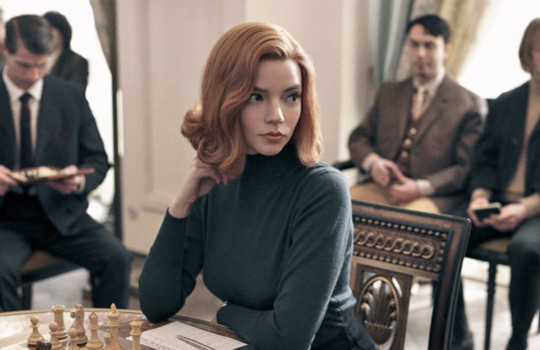
i r e f u s e to watch queens gambit because im so sick of this trope. and im gonna elaborate.
some would say im a woman and also smart. i study Conventionally Smart Subject^TM of physics, although - as some of my colleagues would argue - the dumbest kind of physics, which is cross-disciplinary geophysics. not a lot of equations, more like computation, models, looking at graphs and saying “ahhh... i dont get it”.
any STEM student will tell you that a good deal of professors in STEM do not give a flying fuck about what they look like. the amount. of hairy underbelly sticking out of a too small button up shirt i’ve seen in my years as a student... far too much. in my study, about 75% of the professors are men. the women generally have to look neater than the men because Gender Roles, but a good deal of them still don’t give a fuck about what they look like, if it’s presentable, then that’s what it is.
and don’t get me wrong, there are many female scientists that look fantastic and dress beautifully and are really, really Hot. and i’m a big fan of them.
but like. i feel like in movies and tv shows, if a woman is smart and not hot, she will not be taken seriously. it’s the fucking male gaze. i’m so sick of this tired ass, lazy ass trope of “woman too smart for her own good... she has social issues because she is So Smart. Smarter than the other women. Also wears spandex all the time.” like choose one??? if someone is so intelligent that they spend nearly every breathing moment solving complex problems within their field, they’re gonna forget to shower. and don’t even get me started on exercise to reach that Hollywood Skinny.
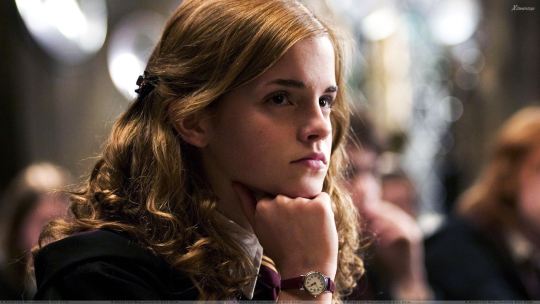
Hermione is the perfect example of this, especially the way they portray her in the movie. In the book, her transition at the gala is striking, because she generally doesn’t care what she looks like, with hair all over the place and an imposing personality that makes her less Attractive To Men. However, Emma Watson was chosen for this role, arguably one of the most conventionally beautiful women, and additionally they did everything to glam her up. Her entrance at the gala did not have a bit of the impact it meant to have had, because Hermione was already beautiful, styled to be beautiful, and generally a nauseatingly perfect character.
Standard Astronout Outfit:

Literally every woman in the Marvel universe is Like This:

Also that scientist chick from Jurassic World that ran from the dinosaurs in fucking high heels like kill me now:
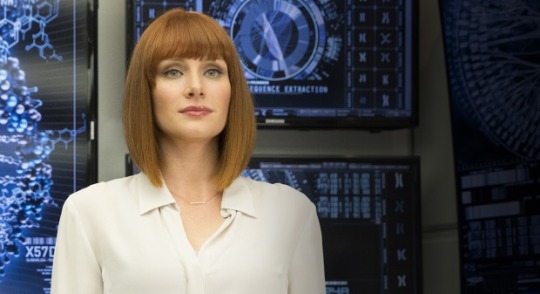
And look, I don’t mean to dig at these women for being Conventionally Hollywood Attractive. It’s not their fault, right? And I also am aware of the ugly woman scientist trope, and that there are films and media in general which tried to break the stupid stereotype that women can be only either smart or sexy, not both. But I’m just so tired of a portrayal of an intelligent, workaholic woman as a sex bomb, an eye candy for men. You don’t get all of these things at once. Women are imperfect. A lot of women spend most time not wanting to be looked at. A lot of women scientists are unsexy most of the time. That should be fine. Women should be portrayed as human in media.
I have to say, there are also plenty fantastic examples of smart women who are also beautiful and not portrayed in this way. In fact, there is more and more of them. My recent fav is Mary Malone from His Dark Materials:
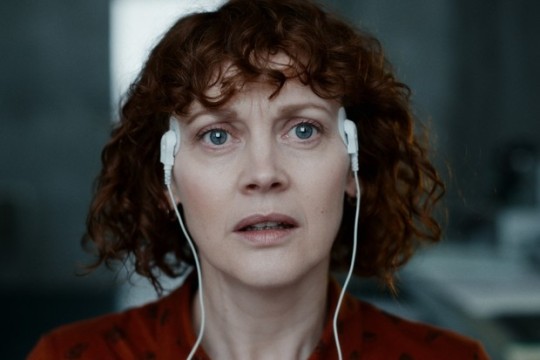
And don’t get me wrong here, I think Mary is h o t. In fact, I would let Mary raw me all night long. But her looks are nowhere near the center attraction of her character. It’s her intelligence, curiosity and kindness. She looks and dresses like a professor I could see at my campus. Her workaholism is expressed as having no family, spending all the time on her work, instead of strutting around in underwear with a bottle of whiskey. Her smarts ARE truly not good for her sometimes, she gets completely swallowed by her research. But she is never portrayed as a Sexy Woman In The Middle Of A Breakdown. And the best thing about Mary is, when she goes on a journey to a parallel world, she wears fucking hiker gear. HIKER GEAR. I love her sm.
Anyway, perhaps you can see my point why I really dislike the main character of the queens gambit without even seeing the series. Because the (record!) popularity of it reminds me of the fact that in the eyes of the world, a woman still has to be Sexy to be Smart. And I’m tired of it, folks. I’m really bored. Bring something new. I’ve seen a woman in underwear. I see her everyday actually. I want to see more female scientists that don’t give a fuck about male gaze, or anyone’s gaze for that matter.
That has been my TED talk.
#every time i write a long post#i begin without capital letters and punctuation#and end it in an essay form#its the queen of inconsistency#well there you have it#mary malone#hermione granger#the queens gambit#whats the queens gambit name#bethany#i dont know#emma stone#in spiderman#lol what was her name#gwen stacy#sigourney weaver#i dont remember the jurassic park character and i dont care for her#jurassic world#no nuance november
58 notes
·
View notes